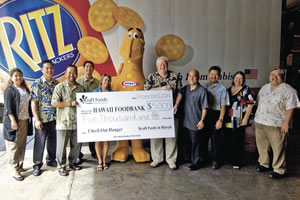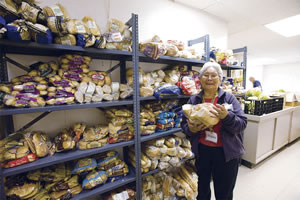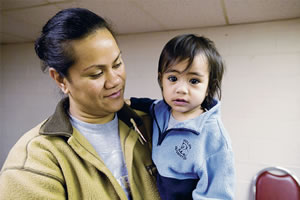The Gift of Food

Above from L to R: Liza Garcia-Mitchell, Clayton Eto, Gerald Shintaku, Tad Fujiwara, Sweetie Pacarro, Cheesy, Dick Grimm, Carl Fukushima, Floyd Mikasa, Polly Kauahi and Kevin Yoneshige. Nathalie Walker photo
Hunger is a growing problem in Honolulu, so stores that normally compete are cooperating in Check-Out Hunger. You can help feed a child, senior or family through the Hawaii Foodbank by purchasing one of these coupons at check-out counters of Safeway, Times and Don Quijote stores
The need has never been greater, so Safeway, Times and Don Quijote are hoping shoppers will purchase a coupon while checking out that will help the Hawaii Foodbank feed our hungry
What will the dinner conversation be like at your house tonight? For several hundred local households, the topic will be where the next meal’s coming from. They are digesting life one anxious moment at a time. They are certain only about one thing: uncertainty.
For a single parent in Waianae, there is nourishment on the table tonight because of a distribution from Hawaii Foodbank. She says it’s a lifeline in her otherwise desperate track of hardships. If she didn’t qualify for charitable help, what would she do?
She answers without hesitation, “My kids and I would shoplift.”
Anti-social behavior or survival instinct? The menu of life has many choices. But for some, unfortunate circumstances have put them in the soup kitchen of distress.
As Hawaii Foodbank’s annual Check-Out Hunger program begins, we have some table talk with its president Dick Grimm and campaign supporters. Gerald Shintaku, Kraft Foods in Hawaii Customer business manager, and Sweetie Pacarro, Hawaii Foodbank promotions spokeswoman, have brought several grocery retailers to join the conversation.

Purchasing a $2.81 coupon feeds a child breakfast for a week. Hawaii Foodbank photo
It’s rare to see major retailers such as Times, Safeway and Don Quijote at the same table unless there’s a serious labor negotiation going on. But charity and community goodwill trumps competitive spirit, especially during the holidays.
They join other participating retailers in an annual appeal for food and funds to feed kids, seniors and families in Hawaii. Kraft Foods has donated $40,000 to the campaign during the past seven years and kicks off this year’s program with a $5,000 donation.
Last year, Check-Out Hunger raised a record-breaking $217,783 for Hawaii’s hungry. Since the program’s inception in 1994, more than $1.5 million has been collected. Even during tough times, Hawaii’s shoppers open their pocketbooks and their hearts.
But the truth is even the nation’s food banks need a bailout. The recession is creating stronger demand at a time when food costs have escalated.
“As tough economic times take their toll, increasing numbers of people are on tight budgets and facing hunger,” says Grimm. As a result, they are learning more about food banks than they ever wanted to know.
“It’s gotten worse the last couple of years,” Grimm adds. “We have a shrinking inventory, and it’s tougher to keep a full warehouse for an ideal one-month supply. We have enough for 14 days right now.”
Charitable souls to the rescue, please. To facilitate donations, Kraft Foods and cooperating retailers place bright-green donation coupons at checkout stands. Customers tear off a $2.81, $12.43 or $16.84 coupon and hand it to the cashier to scan. The amount, which becomes a donation to Hawaii Foodbank, is added to the grocery bill.
Simple. No check-writing, licking stamps or mailing envelopes.
How did they determine the donation amounts?
Glad you asked.

Buying a $12.43 coupon feeds a senior lunch for a week. Hawaii Foodbank photo
A donation of $2.81 feeds a child breakfast for a week; $12.43 feeds a senior lunch for a month; $16.84 feeds a family dinner for a week, according to Grimm.
Quite a value, wouldn’t you say? Can you stretch the family grocery allowance to do the same?
The powerful buying power and clout of Hawaii Foodbank as a central clearinghouse allows this miracle to happen.
Ever wonder especially after recent troubles at an independent food bank on Kaua’i that led to the dismissal of its director what happens to the money and food donations after the collection point? Where does it go, and who is accountable for screening applicants to qualify for aid?
We turn to Grimm for the answers.
Grimm, former general manager at KGMB-TV, was hired in 2000 as interim president of Hawaii Foodbank. That “interim” has lasted nearly 12 years.
Canned goods, packaged foods and other non-perishables that you donate from your cupboard are assembled in the 23,500square-foot warehouse at 2611 Kilihau St. in Mapunapuna. The facility is the central sorting, storage and distribution point.
Funds collected are used to purchase food from a bulk distributor such as Feeding America, the central agency that serves food banks throughout the United States, and with which Hawaii Foodbank is affiliated.
Nonprofit social service agencies, churches and community organizations are qualified by Hawaii Foodbank to become member agencies and receive aid. They must meet strict criteria and so must the recipients of charitable aid. The food bank is facilitator of food aid, not the first line of social services.

Buying a $16.83 coupon feeds a family dinner for a week. Hawaii Foodbank photo
The more than 250 agencies that are members of Hawaii Foodbank have that role. The Aloha United Way is a partner organization.
There are precise guidelines for households receiving aid, such as income level, ages of children in the family and so forth.
The outreach into the community and grassroots distribution are handled by the nonprofit organizations, such as Boys & Girls Clubs, Child & Family Service, Kalihi-Palama Community Center and many churches.
So the flow of food goes from donors, to Hawaii Foodbank, to member agencies and to Hawaii’s hungry.
The key food sources are manufacturers, wholesalers and growers, 38 percent; food purchases and USDA, 33 percent; Hawaii retailers, 21 percent, and community food drives, 8 percent.
The food goes to community distributions, 55 percent; pantries, 32 percent, and various other recipients such as seniors and children, soup kitchens and shelters.
Individuals and direct solicitations account for the biggest piece of the revenue pie at 44 percent. Special events and grants bring in another 37 percent.
Particularly compassionate to food-insecure families are working parents, like KSSK-Kraft Food’s Pacarro and Don Quijote advertising manager Lisa GarciaMitchell.
“It touches my heart,” Pacarro says. “I’m super fortunate to provide for my family and to have the opportunity to give back to the community, especially at this time of year.”
Garcia-Mitchell adds, “My children are ages 10, 9 and 4. Luckily, I work at a grocery store. Our company has been involved in food collections and Check-Out Hunger for several years. It’s become a tradition.”
Both Safeway and Times supermarkets, with expanding reach to shoppers at new store locations statewide, look forward to increased collections at the cash registers.
“Hopefully people recognize the need for giving,” says Tad Fujiwara, marketing department manager of Times Supermarkets. “It’s pretty simple. One (coupon) scan and you’re done.”
Participating stores in this year’s Check-Out Hunger program include Times Supermarkets, Safeway, Don Quijote, Tamura’s Supermarket, Tamura’s Enterprises, Tamura’s Fine Wine & Liquors, Kokua Market Natural Foods Coop, KTA Superstores on the Big Island and Big Save Stores on Kaua’i.
So the talk around the table is hopeful and informative.
But what of the recipients of this food aid? Don’t they deserve a voice in this dialogue?
If you seek truth, you must include their voice. So we do. It speaks volumes about why CheckOut Hunger is relevant.
Listen to a formerly homeless father of six:
“The Hawaii Foodbank has helped me and my family for many years, while we were homeless and while we were in the shelter. Without the food bank, we wouldn’t have dinner most times, ‘cause the food stamps wouldn’t last.
“We would use it every day, but we have no icebox to store foods. There were times when we were struggling, we had no place to go. Foodbank was there to give us food and the shelter gave us hot meals every night.
“What the food bank does for us is help us make ends meet, so we don’t spend too much money on food. Especially for a family like I have: six kids, they’re all growing, they eat a lot.
“The food bank helps everyone, homeless or not homeless.”
For emergency food assistance, call 211 for free and confidential referral services.



